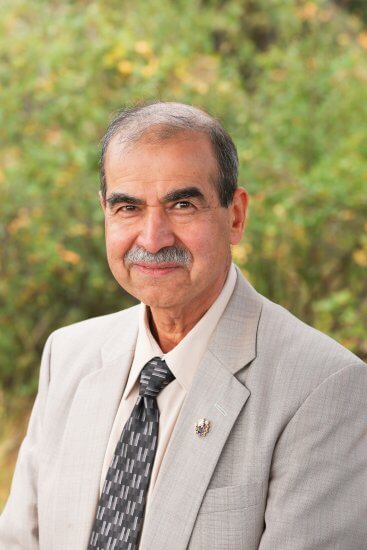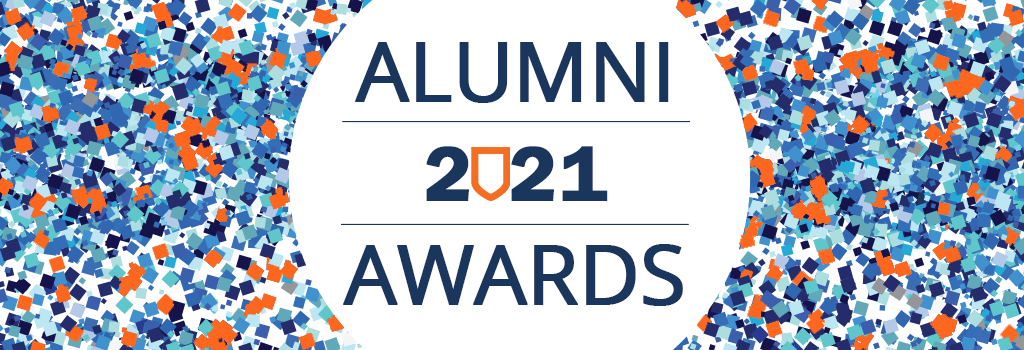From New Delhi to Northwest Territories, Pawan Chugh helps transform communities
Volunteer Service Award winner driven to make a difference

Pawan Chugh (Master of Business Administration ’97) understands poverty as well as anyone, having grown up poor in New Delhi, India, and he knows first-hand how education and volunteerism can lift communities up.
A lot has changed for the Athabasca University (AU) 2021 Volunteer Service alumni award winner in the past 50 years, including moving from New Delhi to Canada’s North. One thing that hasn’t changed is his lifelong commitment to educating himself and helping others reach their potential.
Many people in Yellowknife, NWT, will be able to attest to Chugh’s attitude of helping others in whatever way he can. On top of his professional role supporting businesses by promoting economic development as CEO of the Northwest Territories Business Development and Investment Corporation (BDIC), a role he held from 2005 until he retired in 2019, he has a history of volunteer involvement in the community.
Organizations he has supported over the years include KidSport, the Ekal Vidyalaya Canada, Inclusion NWT (Yellowknife Association for Community Living), the Canadian National institute for the Blind, the Multiple Sclerosis Society, the Alzheimer’s Society, the Yellowknife Seniors Society, the Northwest Territories Disabilities Council, and the Young Women’s Christian Association. This work made him an obvious choice for the Volunteer Service alumni award, which recognizes an AU graduate who has demonstrated a spirit of volunteerism and community service.
Chugh credits his parents for instilling the values of hard work and volunteerism in him, and said he still strives every day to live up to the example they set. They promised him that no matter how hard they had to work, they would provide him with a good education and support him in studying whatever he wanted.
“They promised me that they would get me the best education they could, as long as I can learn,” he said. “They also took a promise from me that I will have an attitude to help others in whatever way I can.”
The value of hard work and education
Chugh’s parents lived on the Pakistan side of the British Partition of India, where they were fairly well off before being forced to migrate to India and bring with them next to nothing.
“They had a real struggle,” he said. “I owe my education to my parents. I still remember my mother going out for hours to do business, to sell things because they didn’t have any capital.”
More than just spending long hours working for the betterment of their family, he also remembers his parents putting in long hours to help their community and improve the lives of the people around them. He recalls his mother visiting smaller schools to support children to reach their educational potential by providing resources—simple meals or school supplies in some cases, or products as life-changing as wheelchairs in others.
“I owe my education to my parents. I still remember my mother going out for hours to do business, to sell things because they didn’t have any capital.”
– Dr. Pawan Chugh, 2021 Volunteer Service Award recipient
Those struggles resulted in Chugh being able to attend an English-language school, where he did fairly well academically. Because his family had experience in the business world, this was something he had picked up from an early age he showed an aptitude for business. While still in New Delhi, he was able to earn bachelor’s degrees in commerce and law from Delhi University in 1978 and 1984, respectively.
While attending school, he kept in mind the lessons his parents had taught him, about both hard work and helping others, and found himself tutoring other students. In this way he was able to advance his own education, and that of others, as well. He completed a chartered accountancy designation and started his own professional practice helping start-up businesses.
Moving to Canada and discovering AU
Chugh moved to Canada in 1988 as a student of Brandon University in Manitoba, and while he was studying he was surprised to get a call telling him his permanent resident visa was ready. It was a surprise, because he had not applied for it, but he was pre-approved and he didn’t balk when it was offered.
“That changed my life,” he said. “I took it, and that made it easier to get a job here.”
That work came at the Port of Churchill, in Churchill, Manitoba, first as a financial analyst. Within six months, he was promoted to a management role. He later served as chief financial and administrative officer until 1997.
It was during this time that Chugh first learned about AU. At the time there weren’t many opportunities to study online, especially in business. So he signed up for the Master of Business Administration (MBA) program at AU—the first school in the world to offer an online MBA.
“I found Athabasca University to be the best vehicle for me to continue my education, because I have a passion to learn and keep learning,” he said. “I was privileged to be in the first batch of AU MBA grads in 1997.”
Lifelong learning in the North
When the Port of Churchill, a Crown corporation, was privatized in 1997, Chugh looked for employment elsewhere and found it in the Northwest Territories. He worked in a variety of government roles for several years, and during that time was also able to earn another online master’s degree, in law, from the University of London.
In 2005, he was named CEO of the BDIC, where he continued to make an impact not just in his professional role but in his educational and volunteer activities, as well. He earned a doctor of philosophy from the University of Queensland in 2016, writing his thesis on a new model for economic development for communities in the North. The perspective he gained from doing economic development work in the territory, which included working with many Indigenous communities, made and continues to make a significant impact on him.
“If you can support education, it builds the infrastructure from bottom up, no matter what level of education—kindergarten, elementary school, high school, university. If we can contribute to education, we are building a good future for our communities. ”
– Dr. Pawan Chugh
In particular, he recalled seeing the housing conditions in the North and the similarities to what he had seen in India—you might have 10 to 12 people living together in a house, it’s in poor condition, and people are struggling to make ends meet. Chugh said his observations of the conditions of Indigenous Canadians in the North brought the issues of colonialism and reconciliation to the forefront in his own mind.
In his retirement, Chugh continues to focus on supporting Indigenous communities—not just in his volunteer work, but also as he pursues two additional PhDs from universities in Australia. He points to the similarities in the histories of Canada and Australia with respect to colonialism and reconciliation, and is planning his research around these issues.
Regardless of what form his academic or volunteer work ends up taking in the future, though, he said he will always remain committed to supporting education in all its forms as the most significant way to lift people up.
“If you can support education, it builds the infrastructure from bottom up, no matter what level of education—kindergarten, elementary school, high school, university,” he said. “If we can contribute to education, we are building a good future for our communities.”
